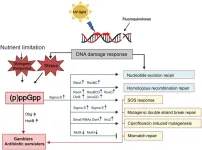(Press-News.org) Climate governance is dominated by men, yet the health impacts of the climate crisis often affect women, girls, and gender-diverse people disproportionately, argue researchers ahead of the upcoming 29th United Nations Climate Summit (COP29) in Azerbaijan.
In an article published today in Lancet Planetary Health, a team of researchers – including several from the University of Cambridge – argue that much more needs to be done to mitigate the impacts of climate change on women, girls and gender-diverse individuals.
Focusing specifically on the intersection between climate change, gender, and human health, the researchers call on countries to work harder to ensure there is gender equity within their delegations to climate conferences and to ensure climate strategies identify gender-specific risks and vulnerabilities and address their root causes.
As the world prepares for COP29, concerns about gender representation and equality have reignited following the initial appointment of 28 men and no women to the COP29 organising committee in January 2024.
The effects of climate change – from heavy rains, rising temperatures, storms and floods through to sea level rises and droughts – exacerbate systemic inequalities and disproportionately affect marginalised populations, particularly those living in low-income areas.
While the specific situation may be different depending on where people live or their social background (like their class, race, ability, sexuality, age, or location), women, girls, and gender minorities are often at greater risk from the impacts of climate change. For example, in many countries, women are less likely to own land and resources to protect them in post-disaster situations, and have less control over income and less access to information, resulting in increased vulnerability to acute and long-term climate change impacts.
They are also particularly at risk from climate-related threats to their health, say the researchers. For example, studies have linked high temperatures to adverse birth outcomes such as spontaneous preterm births, pre-eclampsia and birth defects. Extreme events, which are expected to become more likely and intense due to climate change, also take a severe toll on women's social, physical, and mental well-being. Numerous studies highlight that gender-based violence is reported to increase during or after extreme events, often due to factors related to economic instability, food insecurity, disrupted infrastructure and mental stress.
Dr Kim Robin van Daalen, a former Gates Cambridge Scholar at the Cardiovascular Epidemiology Unit, University of Cambridge, said: “Given how disproportionately climate change affects women, girls and gender minorities – a situation that is only likely to get worse – we need to ensure that their voices are heard and meaningfully included in discussions of how we respond to this urgent climate crisis. This is not currently happening at anywhere near the level it needs to.”
The team summarised the inclusion of gender, health and their intersection in key decisions and initiatives under the United Nations Framework Convention on Climate Change (UNFCCC), and analysed gender representation among representatives of Party and Observer State delegations at COPs between 1995-2023. Progress has been slow, they say.
They highlight how previous scholars have consistently noted that emphasis remains mainly on achieving a gender ‘number-based balance’ in climate governance, over exploring gender-specific risks and vulnerabilities and addressing their root causes. They also discuss how there remains limited recognition of the role climate change has in worsening gendered impacts on health, including gender-based violence and the lack of safeguarding reproductive health in the face of climate change.
Although the situation is slowly improving, at COP28, almost three-quarters (73%) of Party delegations were still majority men, and only just over one in six (16%) showed gender parity (that is, 45-55% women). In fact, gender parity has only been achieved in the ‘Western European and Other’ UN grouping (which also includes North America, Australia and New Zealand). Based on current trends, several countries - particularly those in the Asia-Pacific and Africa regions - are expected to take at least a decade from COP28 before reaching gender parity in their delegations.
Dr Ramit Debnath, former Gates Cambridge Scholar and now an Assistant Professor at Cambridge, said: “The urgency of climate action, as well as the slow understanding of climate, gender, and health connections, is cause for concern. Institutions like the UNFCCC must recognize these disparities, design appropriate methods to improve gender parity in climate governance, and keep these representation gaps from growing into societal and health injustices.”
Beyond ensuring that their voices are heard, more equitable inclusion of women has consistently been suggested to transform policymaking across political and social systems, including the generation of policies that better represent women’s interests. Previous recent analyses of 49 European countries revealed that greater women’s political representation correlates with reduced inequalities in self-reported health, lower geographical inequalities in infant mortality and fewer disability-adjusted life-years lost across genders.
Similar positive findings have been reported related to environmental policies, with women’s representation in national parliaments being associated with increased ratification of environmental treaties and more stringent climate change policies. For example, women legislators in the European parliament and US House of Representatives have been found to be more inclined to support environmental legislation than men.
While the researchers’ analyses focused on achieving gender balance, studies on women’s involvement in climate governance suggest that increased representation does not by itself always lead to meaningful policy changes. Even when formally included, women’s active participation in male-dominated institutions is often constrained by existing social and cultural norms, implicit biases and structural barriers.
Dr van Daalen added: “If we’re to meaningfully incorporate gender into climate policy and practice, we need to understand the risks and vulnerabilities that are gender-specific and look at how we can address them and their root causes at all phases of programme and policy development.
“But we also need to resist reducing women to a single, homogenous group, which risks deepening existing inequalities and overlooks opportunities to address the needs of all individuals. It is crucial to recognise the diversity of women and their embodiment of multiple, intersecting identities that shape their climate experiences as well as their mitigation and adaptation needs.”
The team also highlights that gender-diverse people face unique health and climate-related risks due to their increased vulnerability, stigma, and discrimination. For example, during and after extreme events, transgender people in the United States report being threatened or prohibited access to shelters. Similarly, in the Philippines, Indonesia, and Samoa, gender-diverse individuals often face discrimination, mockery, and exclusion from evacuation centres or access to food. Yet, say the researchers, there are major gaps in knowledge about the health implications of climate change for such groups.
Find out how Cambridge's pioneering research in climate and nature is regenerating nature, rewiring energy, rethinking transport and redefining economics - forging a future for our planet: https://www.cam.ac.uk/climate-and-nature
Reference
Van Daalen, KR et al. Bridging the gender, climate, and health gap: the road to COP29. Lancet Planetary Health; 11 Nov 2024; DOI: https://doi.org/10.1016/S2542-5196(24)00270-5
END
Gender inequality ingrained in global climate negotiations, say researchers
2024-11-11
ELSE PRESS RELEASES FROM THIS DATE:
There's no time like the present for integrating climate and violence policies: The opportunity is right
2024-11-11
The dual goals of climate action and ending violence against children can be achieved according to a new paper by Columbia University Mailman School of Public Health and colleagues at the London School of Hygiene and Tropical Medicine. For the first time, governments are committing funds and making concrete pledges to reach the UN Sustainable Development Goal target of ending violence against children. On November 7th and 8th, the Government of Colombia, with support of the Government of Sweden, UNICEF, the UN Special Representative of the Secretary-General on Violence Against Children, and the World Health Organization will attend the first Global Ministerial Conference on ending ...
Breaking free from negative thoughts using a scientifically gamified app
2024-11-11
(Toronto, November 11, 2024) A new study published in the Journal of Medical Internet Research by JMIR Publications reveals promising results from a digital health intervention that is based on a decade of research at Harvard Medical School and designed to alleviate depressive symptoms. The study, titled "Facilitating Thought Progression to Reduce Depressive Symptoms: Randomized Controlled Trial," found that participants experienced substantial reduction of depressive symptoms by using a gamified mobile app focused on disrupting ruminative thinking.
Led by Prof. Moshe Bar and colleagues, the research ...
The emerging role of (p)ppGpp in DNA repair and associated bacterial survival against fluoroquinolones
2024-11-11
Bacteria frequently encounter adverse environmental conditions, such as nutrient scarcity and antibiotic exposure, which can induce DNA damage. Efficient DNA repair mechanisms are essential for bacterial survival, particularly under such stress conditions. A critical player in these processes is the signaling molecule (p)ppGpp, a phosphorylated guanosine synthesized by bacteria during periods of stress. Initially discovered in Escherichia coli under amino acid starvation, (p)ppGpp is now recognized for its broader roles in modulating cellular functions essential for DNA repair and stress response. By regulating diverse cellular processes, (p)ppGpp not ...
People with fewer resources seen as less trustworthy across cultures, new research shows
2024-11-11
New research in Social Psychological and Personality Science identifies a widespread stereotype linking wealth to perceived trustworthiness across diverse cultures. The research, led by Mélusine Boon-Falleur from the Center for Research on Social Inequalities at Sciences Po in Paris, shows that individuals with fewer material resources are consistently viewed as less trustworthy.
The study, conducted across eight countries including Brazil, Colombia, Democratic Republic of Congo, India, France, Nigeria, Philippines, and the United Kingdom, employed a novel method to uncover stereotypes while avoiding social desirability bias.
"People ...
Inland Delaware watersheds impaired by human waste
2024-11-11
Highlights:
Delaware watersheds show high microbial impairment.
Researchers collected samples from Delaware waters over 2 years and identified microbial DNA signatures present in the water.
The findings suggest that both treated and untreated human waste are the culprit, likely due to infrastructural issues.
Washington, D.C.—Delaware has numerous inland waterways with high microbial impairment from unknown sources. Now, a new study suggests that human waste, both treated and untreated, is responsible for the waterway impairment in these Delaware watersheds. The study was published in Applied and Environmental Microbiology, ...
Study on the ideas and methods of bloodletting therapy in the treatment of heat stroke
2024-11-11
Heat stroke is primarily classified into exertional and non-exertional forms. Exertional heat stroke results from strenuous physical activity in high heat, while non-exertional heat stroke typically affects those exposed to extreme heat without engaging in significant physical exertion. Symptoms include elevated body temperature, impaired consciousness, headaches, muscle spasms, and, in severe cases, cardiovascular overload, cerebral hypoxia, and organ failure. Western medicine’s primary treatments include cooling methods, rehydration, and pharmacological interventions like dexamethasone ...
New measures of patient well-being can be applied readily in clinical care
2024-11-11
Waltham — November 11, 2024 — Two measures of patient well-being, designed for use in busy clinical settings, are described in a Perspective piece in a supplement to Medical Care, the official journal of the Medical Care Section of the American Public Health Association. The journal is published in the Lippincott portfolio by Wolters Kluwer. The journal is published in the Lippincott portfolio by Wolters Kluwer.
The Medical ...
New study links historical redlining to delays in HIV treatment
2024-11-11
A new study from Tulane University finds that historical race-based lending practices are still impacting health today, linking these discriminatory policies to delays in effective HIV treatment within affected neighborhoods.
The lending practice, called redlining, was abolished in 1968. Yet, those living in once historically redlined neighborhoods experience 15% longer delays in achieving viral suppression of HIV compared to those in non-redlined areas, according to the study published in JAMA Internal Medicine.
The disparity can impact both individual ...
Understanding causes of echo chambers: Political news selective exposure across countries
2024-11-11
In our digital age, with easy access to a vast array of information, one would think that readers would naturally be exposed to a wide range of perspectives. However, the opposite seems to be happening, especially in countries like the United States (US), where people often seek out news that reinforces their existing beliefs and avoid content that challenges them. This tendency, known as partisan selective exposure, has been linked to increasing divides and tensions between different ideological groups. But is ...
New study reveals unique adaptations of jaw function and tooth wear in hypercarnivores
2024-11-11
A new study led by Dr. Jack Tseng and published in PeerJ Life & Environment has shed light on the intricate relationship between tooth wear and jaw mechanics in highly carnivorous mammals, known as hypercarnivores. As mammalian teeth do not regenerate, these animals often face declining bite efficiency as their teeth wear down over time. This research explores how different hypercarnivorous species, including scavengers, meat specialists, and bone-cracking predators, adapt biomechanically and possibly behaviorally to manage the challenges posed by tooth wear.
The ...



